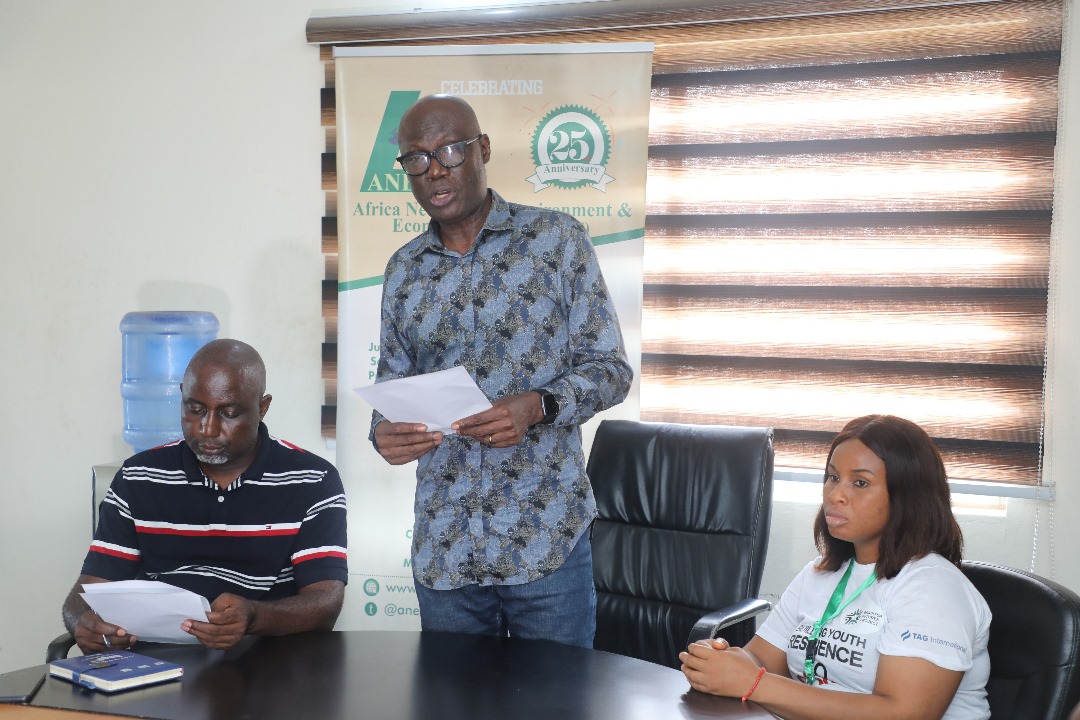By Lucky Isibor
The Africa Network for Environment and Economic Justice (ANEEJ) has called on the Nigerian government to exhibit transparency and accountability in the utilisation of the International Monetary Fund (IMF) Special Drawing Rights ((SDR) worth $3.35 bn allocated to Nigeria in August 2021.
ANEEJ who spoke through its Acting Executive Director, zLeo Atakpu made the call in Benin City on Friday, 14 June while briefing the press to call on Nigerians and members of the National Assembly to demand aAccountability from the government on the utilisation of the SDR allocated to Nigeria by the IMF.
The Board of Governors of IMF in August 2021 had approved a general allocation of $650bn Special Drawing Rights to help boost the liquidity of member countries following the economic crisis caused by the global Covid-19 virus. The SDR is not a loan but a grant by the IMF as is nonrefundable
Out of this amount, African countries received about $33.8bn while Nigeria was allocated the amount of $3.35bn as its own share of the SDR fund.
SDRs are a component of external assets or reserve assets in the balance of payment account that are readily available to and controlled by a country’s monetary authority.
While enumerating the steps ANEEJ has taken thus far to ensure prudent and transparent management of SDR by governments in the West African sub-region, Atakpu lamented the refusal of the Central Bank of Nigeria (CBN) to disclose to Nigerians how the fund has been utilised thus far as the custodian of the (SDR) in Nigeria.
“In August 2023, ANEEJ in partnership with the African Centre for Energy Policy (ACEP) commissioned two research studies for an assessment of the Utilization of the Special Drawing Rights in Nigeria and Ghana as part of activities in the implementation of “Tracking Special Drawing Rights Funds and Raising Citizen’s Voices to End Debt Crises in West Africa’ supported by Open Society Foundation for West Africa (OSIWA). The Reports have since been published both in Nigeria and Ghana and used for advocacy and engagements with stakeholders at various levels.
“The report shows among others that the IMF has no clear guideline on how the SDRs should be utilized by member countries, hence, they are used for sectors in less need of them just as the SDRs are allocated to countries in less need for them. It also shows that developed nations in less need of the SDRs received much more than developing nations in dire need of the facility for development of critical sectors of their economies. It was also discovered that there was a dearth of knowledge around SDRs among stakeholders in Nigeria including the Executive Arm, the Legislature, Civil Society and Media while legislative oversight by the legislature was totally lacking.
“It is against this backdrop that ANEEJ organized a two-day International Hybrid Conference from 22nd and 23rd of November, 2023 in Abuja. The conference was attended by stakeholders drawn from government, legislature, Civil Society and Media. Similarly, ANEEJ organized a two-day Capacity Building Workshop for Leaders of Civil Society and Media on issues of SDRs and debt in the country where participants were equipped with the knowledge of SDR in order to popularize the concept among the citizens and join in the advocacy for accountable and transparent utilization of SDRs in the country.
“ANEEJ has also in the last 9 months been involved in High Level Engagement with IMF, relevant Government Ministries, Agencies and Departments as well as Chairmen of Committees of the National Assembly on the need for open, inclusive, transparent and accountable utilization of the Special Drawing Rights allocated to Nigeria by IMF.
“At the just concluded African Development Bank Annual Meeting (AfBAM2024), in Nairobi Kenya, ANEEJ in collaboration with her partners joined in the advocacy for The Reform of SDRs and the entire global financial architecture to help developing countries cope with their developmental challenges”.
While calling on the Central Bank of Nigeria to publish details of the utilisation of SDR, ANEEJ also tasked the National Assembly to step up its legislative oversight on the utilisation of the SDR among other recommendations.
“We reiterate our call on the Central Bank of Nigeria to publish details of the allocation and utilization of the $3.35bn SDR allocated to Nigeria by IMF and tell Nigerians how it has been utilised. The Legislature to exercise their constitutional role of oversight on the CBN and other agencies saddled with the responsibility of debt management in the country.
“Speed up the process of rechanneling of SDRs through the African Development Bank for the development of social sectors like education, health and infrastructure, even as we appreciate the approval of the framework for the rechanneling by the Fund.The IMF and the developed countries should consider the redistribution of IMF quota on ‘needs’ basis and not on GDP as this would help developing countries cope with the Polycrises they currently face”.
